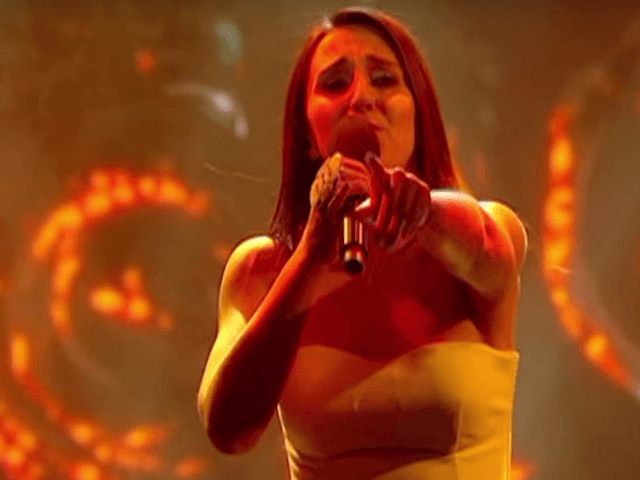Ukraine – which, under attack by Putin’s Russia, was not able to attend Eurovision 2015 – has chosen to submit to Eurovision 2016 a Crimean-Tatar song about the 1944 forced deportation of the entire population of Crimea’s native Tatar people by the Soviet Union under Josef Stalin.
The Herald of Scotland reports:
Susana Jamaladinova, 32, who performs under the stage name Jamala, was chosen on Sunday night. Her song 1944, which is sung half in English and half in Tatar, Jamala’s song tells the story of the Soviet Red Army’s deportation of nearly 250,000 Crimean Tatars in 1944. […]
They were not allowed to return to Crimea until the 1980s. Jamaladinova herself was born in Kyrgyzstan. The song lyrics do not touch on Russia’s 2014 annexation of Crimea, but entering the singer in the hugely popular song contest could raise the issue by implication. “This song really is about my family, my grandmother,” Jamala said. “I had to write it. It is a memorial song and it is difficult for me to sing it.”
On November 12, 2015, Ukraine’s Parliament recognized the forced deportations as an act of genocide and has marked May 18 as a Day of Remembrance.
The late British scholar of Soviet tyranny, Robert Conquest, detailed this event in his 1970 book The Nation Killers: The Soviet Deportation of Nationalities. He wrote that, in the midst of WWII, “reports continued to come out about Tatar bravery in anti-German partisan units and in the ranks of the Red Army. Some became Heroes of the Soviet Union.” Nevertheless, the Soviets declared all Tatars to be Nazi-collaborators, and thus sentenced the entire population to deportation:
The Crimean deportations followed the German evacuation of the area much more rapidly than in the other cases. The Crimea was only fully liberated in April 1944, and the Crimeans were removed in May-June – among them the members of the pro-Soviet partisan movement, including its leader, Khaurullakh. This deportation, which seems to have been carried out with an accompaniment of much killing and brutality, was supervised by Marshal Voroshilov.
Accounts which have reached the West in the past year or so indicate that on the night of 18-19 May 1944 the Crimeans were given fifteen minutes to collect what belongings they could carry, and assembled for deportation. In some cases only five minutes were given, and no belongings or food allowed. They were mainly taken to reservations in the Urals, Kazakhstan and Uzbekistan, though they have also been noted in Yakutia, Birobidjan, Kirgizia and elsewhere. The trip to Kazakhstan took 3-4 weeks. Forty-six per cent are estimated to have perished in the first eighteen months. From a village of thirty families, only five had any survivors at all. Many accounts are of the families of Soviet Army soldiers being taken. In one family, a war widow with eight children, all but one girl died of hunger.
Meanwhile, back in the Crimea ‘everything was done to eradicate all traces of the national life of the Tatars and even the memory of their existence. Their houses were demolished and their vines and orchards allowed to become wild and overgrown. The Tatars’ cemeteries were ploughed up and their ancestors’ remains torn out of the ground. … Everything written and printed in the Crimean Tatar language was burned, from ancient manuscripts to the classics of Marxism-Leninism. The history of the Crimea was falsified by hacks with diplomas’, as an appeal by the Moscow group of intellectuals called ‘Russian Friends of the Crimean Tatars’ has lately put it.
The use of mass murder and falsified history to erase an entire civilization from existence is a common Communist tactic. It was the reason for Stalin’s terror-famine against Ukraine and the Communist Chinese occupation of Tibet.
Ukraine has, since the overthrow of Russian-puppet government of Viktor Yanukovych and Putin’s annexation of Ukraine’s Crimean peninsula and invasion of Eastern Ukraine, made a point of remembering the crimes of the Soviet Union. In 2014, the defining novel of the Crimean-Tatar deportations, Dream Land by Lily Hyde, was translated into Ukrainian.
The lyrics of “1944” by Jamala are as follows:
When strangers are coming,
they come to your house
They kill you all and say
We’re not guilty, not guilty
Where is your mind, humanity cries
You think you are gods, but everyone
dies
Don’t swallow my soul, our souls
I couldn’t spend my youth there
Because you took away my peace
I couldn’t spend my youth there
Because you took away my peace
We could build a future, where people
are free
To live and love, the happiest time
Our time
Where is your heart, humanity rise
You think you are gods, ha, but
everyone dies
Don’t swallow my soul, our souls
I couldn’t spend my youth there
Because you took away my peace
I couldn’t spend my youth there
Because you took away my peace
I couldn’t spend my youth there
Because you took away my peace
I couldn’t spend my youth there
I couldn’t have my homeland

COMMENTS
Please let us know if you're having issues with commenting.